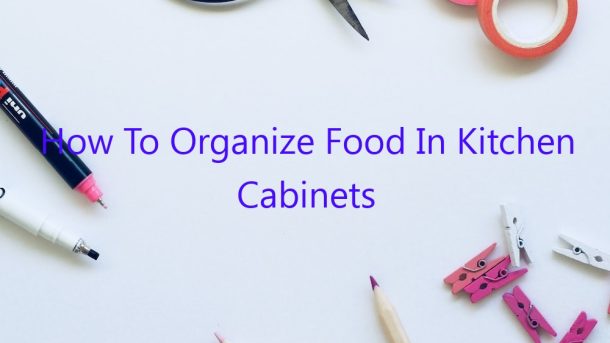Do you feel like you are constantly searching for something in your kitchen cabinets? Are you struggling to find a space for everything? If so, it may be time to reorganize your food storage.
The first step is to figure out what you need to store. Group like items together and place them in the same area. This will make it easier to find what you are looking for and to put things back where they belong.
Consider using some of the following tips to help you organize your food storage:
-Place the most-used items in the front of the cabinet.
-Store items that you use less often in the back of the cabinet.
-Use storage containers to organize your food.
-Label your containers to make it easier to find what you need.
-Create a food rotation system to make sure you use everything before it expires.
By following these tips, you can create a more organized and functional kitchen cabinet.
Contents [hide]
What is the most efficient way to organize kitchen cabinets?
kitchen cabinets
One of the most important rooms in a home is the kitchen. Not only is it used for cooking and eating, but it’s also a gathering place for family and friends. That’s why it’s important to have the space organized in a way that makes it easy to use.
One of the most efficient ways to organize kitchen cabinets is to use the KonMari Method. This popular organizing method was developed by Marie Kondo, a Japanese organizing consultant. The KonMari Method involves tidying your home in a specific order, and it’s been proven to be an effective way to get your home in order.
The first step in using the KonMari Method to organize kitchen cabinets is to gather all of your kitchen items together. This might seem like a daunting task, but it’s important to get everything out in the open so that you can see what you have.
Once you have all of your kitchen items together, it’s time to start sorting. The KonMari Method recommends sorting your items into five categories: clothes, books, papers, komono (miscellaneous items), and sentimental items.
When sorting kitchen cabinets, start with the komono category. This includes items like pots and pans, dishes, utensils, and food. Separate these items into two piles: those that you use often and those that you don’t use often.
The next step is to organize the items that you use often. These items should be placed in an easily accessible location, such as a drawer or on a shelf. The items that you don’t use often can be stored in a cabinet or in another location that’s not as easily accessible.
The final step is to put away any sentimental items. These items should be stored in a location that’s special to you, such as a cabinet or a drawer.
By following these steps, you can organize your kitchen cabinets in a way that makes them more efficient and easier to use.
How do you store food in cupboards?
With the exception of the refrigerator and freezer, just about every other food storage area in your house is a cupboard. Cupboards come in all shapes and sizes, and are used to store everything from food to pots and pans. Storing your food in cupboards is a great way to keep everything organized and easy to find.
There are a few things to keep in mind when storing food in cupboards. First, make sure that all food is properly sealed and stored in airtight containers. This will help to keep food fresh and prevent bugs from invading your cupboards. Second, make sure that cupboards are clean and free of any dirt or debris. Finally, be sure to rotate your food stock regularly to ensure that you are using the oldest food first.
There are a few different ways to store food in cupboards. One popular method is to use stackable containers. This allows you to store a lot of food in a small amount of space. Another popular method is to use lazy Susans. This allows you to store food items in a circular pattern, making it easy to access everything.
Whatever methods you choose, be sure to make use of every inch of space in your cupboards. This will help to keep your food organized and easy to find.
How should you arrange food in the kitchen?
When it comes to arranging food in the kitchen, there are a few things to keep in mind. The most important thing is to make sure that everything is within reach. You don’t want to have to reach across the stove to get a pan, for example.
Another thing to consider is how you want to use the space. If you want to be able to move around the kitchen easily, you should consider having a clear work area in the center of the room. You can put appliances and cabinets around the perimeter, and use the center of the room for cooking and prepping food.
If you have a lot of storage space, you may want to consider using it to organize your food. You can put all of your canned goods in one cabinet, for example, or all of your baking supplies in another. This will make it easy to find what you need when you need it.
Finally, think about how you want to use the space. If you entertain a lot, you may want to consider having a separate area for dining. You can put a table and chairs in one corner of the room, and use the rest of the space for cooking and storage.
What goes where in kitchen cabinets?
When it comes to kitchen cabinets, there are a few things to keep in mind. What goes where, for instance?
The best way to approach this is to start with the bottom cabinets. Generally, the rule of thumb is that the heavier items go on the bottom, while the lighter items go on the top. This is because the bottom cabinets are closer to the ground, and so they’re better equipped to handle the weight.
That said, there are a few exceptions to this rule. For example, if you have a lot of dishes, you may want to put them on the bottom cabinet so that they’re easier to reach. Conversely, if you have a lot of spices, you may want to put them on the top cabinet so that they’re not as easily accessible.
When it comes to the middle cabinets, the same general rules apply. The heavier items go on the bottom, and the lighter items go on the top. However, you may want to consider putting your dishes in the middle cabinet, so that they’re easier to access from both the top and the bottom.
As for the top cabinets, these are typically used for storage purposes. You can put anything you want in them, as long as it’s lightweight. This includes dishes, glasses, and other kitchen supplies.
When it comes to organizing your kitchen cabinets, there are a few things to keep in mind. The first is to make sure that you have enough room to store everything you need. The second is to make sure that everything is easy to access. The third is to make sure that everything is organized in a way that makes sense.
If you’re having trouble organizing your kitchen cabinets, consider using shelves or dividers. This will help to keep everything in its place, and it will make it easier to find what you’re looking for.
At the end of the day, it’s important to tailor your kitchen cabinet organization to your own needs. There is no one-size-fits-all solution, so you may have to experiment a little before you find the system that works best for you.
What are the 9 step in organizing kitchen cabinets?
There are numerous things to think about when organizing your kitchen cabinets. The nine steps below can help make the process a little less daunting.
1. Purge
The first step is to purge your cabinets of any items you no longer need or use. Be ruthless in your purging – if you haven’t used it in the last year, get rid of it.
2. Group Items by Category
Once you’ve purged, group like items together. This will make it easier to find what you’re looking for and to put things back where they belong.
3. Create Labels
Labels are key when organizing your cabinets. They make it easy to see where things go and help keep things organized.
4. Assign a Home for Each Item
assign a home for each item in your cabinet. This will help you remember where everything goes and makes it easy to put things back where they belong.
5. Use Shelf Risers
Shelf risers can be helpful when organizing your cabinets. They create more space on the shelf, which can be helpful for small items.
6. Use a Pull-Out Cabinet System
A pull-out cabinet system can be a great way to organize your cabinets. It allows you to see everything that’s in your cabinet at a glance and makes it easy to grab what you need.
7. Use Storage Containers
Storage containers can be helpful for organizing your cabinets. They can help you store small items and keep them together.
8. Install a Magnet Strip
A magnet strip can be a great way to organize your cabinet. It can help you store knives, pots and pans, and other metal items.
9. Use a Lazy Susan
A lazy Susan can be a great way to organize your cabinets. It can help you store spices, canned goods, and other small items.
How do I declutter my kitchen cabinets?
When your kitchen cabinets are cluttered, it can be difficult to find what you need and it can also be a fire hazard. Here are some tips on how to declutter your kitchen cabinets.
The first step is to go through everything in your cabinets and get rid of anything that you don’t use. This might include old spices, pots and pans that you never use, or dishes that you don’t like.
Once you’ve gotten rid of the unnecessary items, it’s time to organize what’s left. You can do this by category, such as putting all of the pots and pans in one drawer and all of the spices in another.
Another way to organize your cabinets is by frequency of use. This means that you would put the items that you use the most at the front of the cabinet and the items that you use the least at the back.
If you have a lot of items that don’t have a specific place to go, you can create storage spaces using baskets and containers. This will help you to keep your cabinets organized and decluttered.
Following these tips will help you to declutter your kitchen cabinets and make your kitchen more organized and functional.
What should you always have in your food cupboard?
There are some key things that you should always have in your food cupboard, in order to make sure that you have a well-rounded and nutritious diet. Here are some of the most important things to keep on hand:
Carbohydrates: It’s important to have a good supply of carbohydrates in your food cupboard, as they are the main source of energy for the body. Good sources of carbohydrates include whole grain breads, pasta, and cereals.
Protein: Protein is essential for maintaining muscle mass, and it’s important to have a good supply of it in your food cupboard. Good sources of protein include meat, poultry, fish, eggs, and dairy products.
Fruit and vegetables: Fruit and vegetables are an important part of a healthy diet, and it’s important to have a good variety of them in your food cupboard. Try to include a wide variety of fruits and vegetables in your diet, in order to get the most benefit from them.
Beverages: It’s important to have a good selection of beverages in your food cupboard, in order to stay hydrated and healthy. Be sure to include a variety of beverages, such as water, milk, juice, and tea.
Spices: Spices can add flavor to food and can also provide health benefits. It’s a good idea to have a variety of spices in your food cupboard, so that you can add flavor to your food.
These are some of the most important things to have in your food cupboard. By having these items on hand, you’ll be able to create healthy and nutritious meals for yourself and your family.




